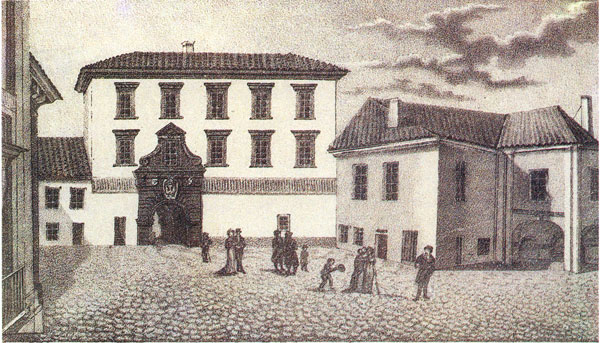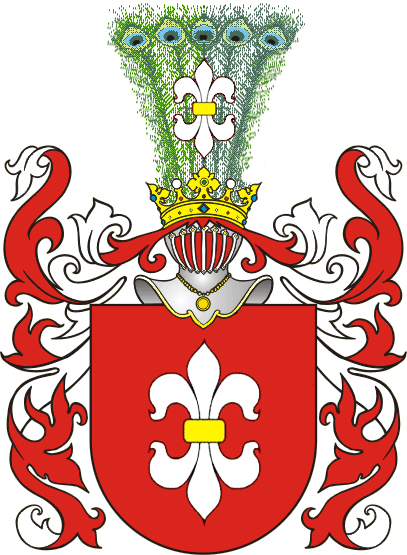|
Nagana Szlachectwa
Nagana szlachectwa ( la, 'Vituperatio nobilitatis'), literally reprobation/reprimand/censure of nobility, also translated by Norman Davies as Test of NobilityNorman Davies, '' God's Playground''/ref> was a legal procedure of the revocation of nobility in the Polish–Lithuanian Commonwealth. Due to the absence of formalized heraldry laws and lineage in early Poland, nobility of a person was tested in a regular court. The confirmation of nobility was based on calling for a certain number of witnesses. In Poland this was in accordance with a 1633 statute, in Lithuania by Chapter 3, Article 22 of a 1588 Statute. The latter demanded two witnesses each from the maternal and paternal side. The penalty for perjury was being stripped of one's own szlachta status, by the Constitution of 1601. In case of the successful ''nagana'', the accuser earned up to half of the property of the accused, with the other half going to the state. The justice was highly prone to miscarriage, in particular, ... [...More Info...] [...Related Items...] OR: [Wikipedia] [Google] [Baidu] |
Norman Davies
Ivor Norman Richard Davies (born 8 June 1939) is a Welsh-Polish historian, known for his publications on the history of Europe, Poland and the United Kingdom. He has a special interest in Central and Eastern Europe and is UNESCO Professor at the Jagiellonian University, professor emeritus at University College London, a visiting professor at the Collège d'Europe, and an honorary fellow at St Antony's College, Oxford. He was granted Polish citizenship in 2014. Academic career Davies was born to Richard and Elizabeth Davies in Bolton, Lancashire. He is of Welsh descent. He studied in Grenoble, France, from 1957 to 1958 and then under A. J. P. Taylor at Magdalen College, Oxford, where he earned a BA in history in 1962. He was awarded an MA at the University of Sussex in 1966 and also studied in Perugia, Italy. Davies intended to study for a PhD in the Soviet Union but was denied an entry visa, so he went to Kraków, Poland, instead. Davies studied at the Jagiellonian Univ ... [...More Info...] [...Related Items...] OR: [Wikipedia] [Google] [Baidu] |
God's Playground
''God's Playground: A History of Poland'' is a history book in two volumes written by Norman Davies, covering a 1000-year history of Poland. Volume 1: ''The origins to 1795'', and Volume 2: ''1795 to the present'' first appeared as the Oxford Clarendon Press publication in 1981 and have since been reprinted in multiple times, and translated into Polish as ''Boże igrzysko : Historia Polski'' by Elżbieta Tabakowska (2 volumes in 1, with 1183 pages by Znak Publishers of Kraków). Davies was inspired to the title by Jan Kochanowski's 1580s poem ''Boże igrzysko'' ("Mankind: Bauble of the Gods"). The book, which most editions split into two volumes, has received favourable reviews in the international press, and is considered by many historians"This is a remarkable book... this is a major work that is imaginative, thought-provoking and extremely well written".-- Piotr S. Wandycz, review in The American Historical Review, Vol. 88, No. 2 (Apr. 1983), pp. 436-437JSTORbr> L. R. Lewitter ... [...More Info...] [...Related Items...] OR: [Wikipedia] [Google] [Baidu] |
Revocation Of Nobility
Revocation of nobility is the removal of the noble status of a person. It should be distinguished from the concept of dérogeance ("derogation" of nobility), which, e.g., in the context of French history, led to removal of the privileges of nobility, but not necessarily the right for nobility itself. In particular, the nobility of descendants was not automatically lost. Nobility could be restored by the King's Letter of Rehabilitation (''Lettre de réhabilitation''). Since nobility was exempted from taxes, especially the ''taille'', many usurped the appearances of nobility, and this usurpation could continue across generations. Therefore, in France there was a special establishment "Grand Inquiry into Nobility" '' Grande enquête sur la noblesse'', which was in force during 1666–1727. This was accompanied by various edicts which declared certain elements of the outfit (heraldry, armaments, decorations, etc.) to be permitted only for nobility. Revocation of usurped nobility wa ... [...More Info...] [...Related Items...] OR: [Wikipedia] [Google] [Baidu] |
Polish–Lithuanian Commonwealth
The Polish–Lithuanian Commonwealth, formally known as the Kingdom of Poland and the Grand Duchy of Lithuania, and, after 1791, as the Commonwealth of Poland, was a bi-confederal state, sometimes called a federation, of Crown of the Kingdom of Poland, Poland and Grand Duchy of Lithuania, Lithuania ruled by a common Monarchy, monarch in real union, who was both King of Poland and List of Lithuanian monarchs, Grand Duke of Lithuania. It was one of the largest and most populous countries of 16th- to 17th-century Europe. At its largest territorial extent, in the early 17th century, the Commonwealth covered almost and as of 1618 sustained a multi-ethnic population of almost 12 million. Polish language, Polish and Latin were the two co-official languages. The Commonwealth was established by the Union of Lublin in July 1569, but the Crown of the Kingdom of Poland and the Grand Duchy of Lithuania had been in a ''de facto'' personal union since 1386 with the marriage of the Polish ... [...More Info...] [...Related Items...] OR: [Wikipedia] [Google] [Baidu] |
Ennoblement
Ennoblement is the conferring of nobility—the induction of an individual into the noble class. Currently only a few kingdoms still grant nobility to people; among them Spain, the United Kingdom, Belgium and the Vatican. Depending on time and region, various laws have governed who could be ennobled and how. Typically, nobility was conferred on individuals who had assisted the sovereign. In some countries (e.g. France under the ''Ancien Régime''), this degenerated into the buying of patents of nobility, whereby rich commoners (e.g. merchants) could purchase a title of nobility. Ennobling qualities Medieval theorists of nobility relied on earlier classical concepts (Platonic, Aristotelian and Christian-Hellenistic) of what personal traits and virtues constitute grounds for ennoblement. In Plato's Republic, he provides for promotion and degradation of citizens according to a strict spiritual meritocracy. In the words of Will Durant, "If the ruler's son is a dolt he falls at th ... [...More Info...] [...Related Items...] OR: [Wikipedia] [Google] [Baidu] |
Crown Tribunal
The Crown Tribunal ( pl, Trybunał Główny Koronny, la, Iudicium Ordinarium Generale Tribunalis Regni) was the highest appellate court in the Crown of the Kingdom of Poland for most cases. Exceptions were if a noble landowner was threatened with loss of life and/or property, when he could appeal to the Sejm court (Parliament court). In 1578, King Stefan Batory created the Crown Tribunal to reduce the enormous pressure on the royal court. That placed much of the monarch's juridical power in the hands of the elected deputies of the szlachta (nobility) and further strengthened that class. In 1581, the Crown Tribunal was joined by a counterpart in Lithuania, the Lithuanian Tribunal (''Trybunał Litewski''). The tribunal consisted of 27 secular deputies elected from the nobility (szlachta) annually during the sessions of the local parliaments (sejmiks) and 6 ecclesiastical deputies elected by their respective Chapters. The tribunal was headed by a Tribunal President (''prezydent'' for ... [...More Info...] [...Related Items...] OR: [Wikipedia] [Google] [Baidu] |
Lithuanian Tribunal
The Lithuanian Tribunal (; pl, Trybunał Główny Wielkiego Księstwa Litewskiego) was the highest appellate court for the nobility of the Grand Duchy of Lithuania. It was established by King Stephen Báthory in 1581 as the counterpart to the Crown Tribunal ( pl, Trybunał Główny Koronny) of the Crown of the Kingdom of Poland, established in 1578. The judges were elected from local nobles furthering nobility's Golden Liberty. The Tribunal ceased to exist after the Third Partition of Poland-Lithuania in 1795. Palace of the Lithuanian Tribunal was demolished in December 1836 – April 1837. Establishment After the legal reforms of 1563–64, members of the Lithuanian nobility received the right to appeal to the Grand Duke. However, soon Grand Duke's court was severely backlogged and became clear that reforms are needed. The nobles themselves demanded a "supreme court". The Tribunal was officially established on March 1, 1581; its first session was held on April 30, 1582. In eff ... [...More Info...] [...Related Items...] OR: [Wikipedia] [Google] [Baidu] |
Heraldic Family
A heraldic clan (''ród herbowy''), in Poland, comprised all the noble (''szlachta'') bearers of the same coat of arms. The members of a heraldic clan were not necessarily linked by consanguinity. The concept was unique to Polish heraldry. History The Polish word ''herb'' derives from the German ''Erbe'', "inheritance" or "heritage", and denotes a coat of arms. Unrelated families could be granted the same coat of arms and thus become co-armigers sharing the same ''herb''. Bearers of the same coat of arms were variously called ''herbowni'', ''współherbowni'' (co-armorials), or ''klejnotni'', from ''klejnot'', "jewel". The numbers of such individual families often reached several dozen; several hundred were not uncommon. The heraldic-family tradition constitutes one of the hypotheses about the origins of the Polish nobility: the unique feature of Polish heraldry being the practice of inducting unrelated families into the same coat of arms, sometimes with minor variations of ... [...More Info...] [...Related Items...] OR: [Wikipedia] [Google] [Baidu] |
Dérogeance
Dérogeance ("derogation (of nobility)") was grievance for persons who did acts deemed unworthy of the noble status. A consequence of dérogeance was loss of the privileges of nobility (but not full revocation of nobility). In particular the person was no longer free of taxation. Dérogeance included engagement in certain professions and occupations considered to be "lowly". In particular, it prevented the nobility from engaging in commerce and retail trade. Many ancient cultures restricted their noble classes from commercial activity,"The Thracians, Scythians, Persians, Egyptians, Lydians, Lacedaemonians, Athenians, Thebans, and Romans were all believed to have expelled from the nobility anyone who engaged in commerce. . . . Tiraqueau traced the origins of ''dérogeance'' back to Noah and Adam; Gilles-André La Roque saw its beginning in heaven." although this was less true of the Roman Empire. As the economies of Europe evolved in the latter 17th century and the 18th century, ... [...More Info...] [...Related Items...] OR: [Wikipedia] [Google] [Baidu] |
Polish Nobility
The ''szlachta'' (Polish: endonym, Lithuanian: šlėkta) were the noble estate of the realm in the Kingdom of Poland, the Grand Duchy of Lithuania, and the Polish–Lithuanian Commonwealth who, as a class, had the dominating position in the state, exercising extensive political rights and power. Szlachta as a class differed significantly from the feudal nobility of Western Europe. The estate was officially abolished in 1921 by the March Constitution."Szlachta. Szlachta w Polsce" ''Encyklopedia PWN'' The origins of the ''szlachta'' are obscure and the subject of several theories. Traditionally, its members owned land (allods), [...More Info...] [...Related Items...] OR: [Wikipedia] [Google] [Baidu] |
Polish Heraldry
Polish heraldry is the study of the coats of arms that have historically been used in Poland and the Polish–Lithuanian Commonwealth. It treats of specifically Polish heraldic traits and of the Polish heraldic system, contrasted with heraldic systems used elsewhere, notably in Western Europe. Due to the distinctive ways in which feudal societies evolved, Poland's heraldic traditions differ substantially from those of the German lands, France, and the British Isles. Polish heraldry is an integral part of the history of the Polish ''szlachta'' (nobility). History Unlike Western Europe, in Poland, the did not emerge exclusively from the feudal class of knights but stemmed in great part from earlier Slavic local rulers and free warriors and mercenaries. Rulers often hired these free warriors and mercenaries to form military units ( pl, Drużyna) and eventually, in the 11th century during the time of Casimir I the Restorer with the development of feudalism, armies paid by the Pri ... [...More Info...] [...Related Items...] OR: [Wikipedia] [Google] [Baidu] |


